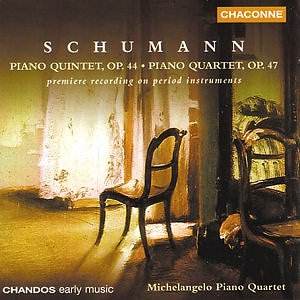Comparison Period Instrument Recording:
Burnett/Fitzwilliam Quartet/Amon Ra
Before discussing Schumannís
chamber music and the Chandos performances,
I should address the claim by Chandos
that these are the premiere recordings
on period instruments. The fact is that
both programmed works have been recorded
already on period instruments, and I
have a particularly warm feeling for
the performances on Amon Ra by fortepianist
Richard Burnett and the Fitzwilliam
Quartet.
Personally, I find
it hard to fathom how Chandos could
be unaware of alternative recordings
of the Quintet and Quartet on period
instruments. Just a few short minutes
on the Internet told me that other period
instrument discs are available.
On to Schumannís chamber
music that does not get nearly the attention
given his lieder, piano music and symphonies.
Yet, there are approximately thirty
recordings of the Piano Quintet in the
catalogues, while the Piano Quartet
has about ten entries. The greater popularity
of the Piano Quintet is due to its more
exuberant nature along with more immediately
attractive melodic content. I do not
claim that the chamber music possesses
the same level of inspiration as in
Schumannís most popular genres, but
they are excellent works worthy of repeated
listening.
At this point I might
as well address the issue of sound quality.
The Chandos sound is overly rich and
reverberant, allowing for little detail
or clarity. In contrast, the Amon Ra
soundstage is rather dry and clinical
with abundant detail presented by the
artists. In addition to the Amon Ra
sound being more realistic, it is far
ahead of the Chandos sound in offering
secondary voice details and impact.
As an example, the secondary voices
in the Piano Quintetís 1st
Movement provide most of the tension,
and the sound from Chandos only gives
us a glazed hint of this tension. Of
course, some listeners will prefer the
richer and more integrated Chandos sound,
but I find it inappropriate for the
occasion.
What we have here are
chamber works ideal for Schumannís parlor,
and there is no better way to be transported
to his home for an evening of music
than through excellent period instrument
performances in realistic sound. Chandos
comes down the pike with Ďsymphonic
and slickí sound that blows all thoughts
of Schumann making music on the homefront
out of the water. Why would Chandos
do this? Well, rich sound has been the
rage for decades now, and Chandos has
certainly been a leader of this trend.
The company usually offers fine detail
as well, but it is absent in this Schumann
disc.
It may well be that
the Michelangelo Piano Quartetís performances
arenít far below the quality from Burnett
and company, but the Chandos soundstage
does not allow for a fair comparison.
Another advantage for the Amon Ra disc
is that it includes the Schumann Sonata
for Violin and Piano in A minor which
extends the disc to about 75 minutes
of music compared to under 60 minutes
for the Chandos release.
By the way, the Fitzwilliam
String Quartet and Burnett play splendidly.
They provide plenty of spunk and vitality,
give secondary voices ample projection,
apply incisive accenting at the right
moments, and convey Schumannís poetry
and angst in healthy measure. I am especially
smitten with the groupís performance
of the exciting final Movement of the
Piano Quintet. They play it with great
exuberance and inject a slice of menace
into the musical mix to enhance the
diversity of themes. Further, the surprising
fugal section is given an exceptional
display of counterpoint by the ensemble.
One last feature is that Burnett plays
a Viennese fortepiano by Graf which
would be very similar to the one owned
by Clara Schumann, adding another layer
of historical and aesthetic reality
to the production.
In conclusion, the
Chandos recording could be thought of
as a disc for those who do not really
appreciate period instrument performances.
However, I doubt that modern instrument
enthusiasts would be willing to trade-in
their Beaux Arts sets on Philips for
alternatives that offer so little detail
and clarity. Overall, I consider the
Chandos/Schumann disc a failure, and
this is the first time that I have not
appreciated a Chandos recording.
My best recommendation
is to acquire the Amon Ra disc and listen
to idiomatic performances of two exceptional
Schumann chamber works. Burnett and
company will take you into Schumannís
parlor as long as you have imagination
to spare.
Don Satz
